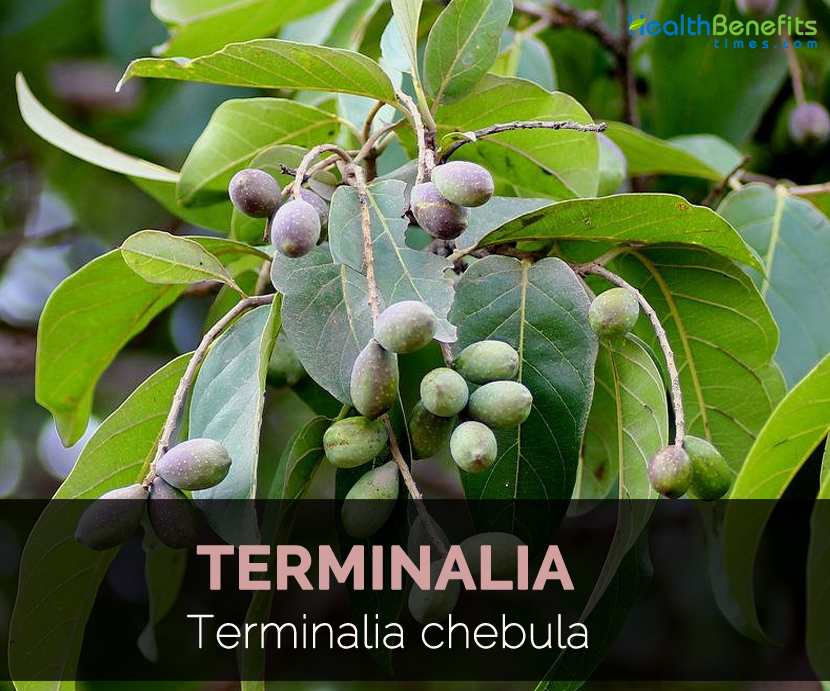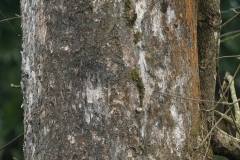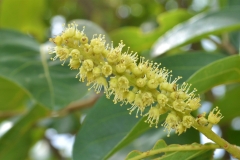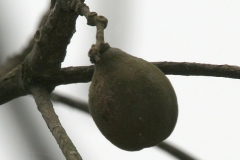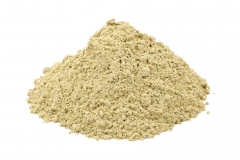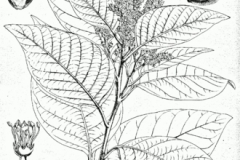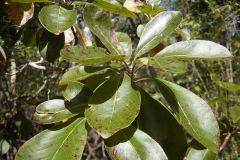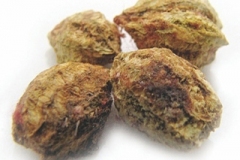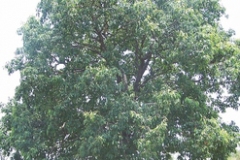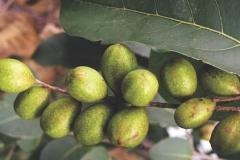The tree has cracked, thick and black bark. Leaves are oval, opposite or alternate and taper to the tip. Flowers occur in short panicles or terminal spikes and emits unpleasant strong odor and is yellow in color. Flowers give way to yellow to orange brown and ovoid fruits which comprises of elliptical seeds.
It is used as a traditional medicine in India, Africa and Asia. Terminalia is used as a medicinal plant in Ayurveda and used as an aid for digestive problems, gum inflammation, wounds, coughs and asthma. It is considered to be laxative, expectorant, stomachic, tonic and hemostatic. It also displays antibacterial and antifungal properties. It is used for treating various diseases such as paralysis, cancer, ulcers, cardiovascular diseases, gout, arthritis, leprosy and epilepsy. Seeds are edible and also extract edible oil. The sour edible fruits are used for manufacturing black salt. The wood is heavy, hard, strong but not durable and is used as furniture material and for construction.
Leaves
Leaves are 10 to 20 cm long, simple, sub opposite, petiolate, exstipulate. Laminae is broadly elliptic to elliptic-oblong and rarely ovate, bases are obtuse, margins are entire and tips are glabrescent and acute.
Fruit
Drupes are glabrous, sub globose to ellipsoid, about 2.5 to 5 cm by 1.5-2.5 cm, ridged, smooth or 5 angulate, wrinkled and turn blackish when dried. Fruits have astringent substances such as gallic acid, Chebulinic acid and tannic acid.
Seed
Fruit encloses single seed which is rough, ellipsoid about 1.0-2.0 cm by 0.2 -0.7 cm.
Health Benefits of Terminalia chebula
- Cognitive health
Terminalia chebula helps to promote cognitive functioning. It enhance brain functions, boost short term and long term memory and learning retention. It is due to oxygenation which is enhancing with the use of plant. The oxygenation clears neuro pathways to promote overall brain function. The brain is a muscle that requires exercise. Fit brain promotes the functions such as fight or flight response. Brain function and enhanced memory results in increase performance levels. Strong cognitive functioning includes, retention of information, better memory, increased focus, high innovation levels, more energy and mindfulness.
- Digestive health
Constipation provokes pain, discomfort as well as embarrassment. Terminalia chebula is a treatment for constipation. Constipation causes less than three bowel movements in a week and severe constipation causes one bowel movement in a week. It also results severe discomfort while passing bowel movements. This plant promotes and aids healthy digestion. Add a teaspoon of Terminalia chebula powder and drink 1-2 times a day to cleanse colon and clear 15 pounds of toxic waste in the system.
- Eye cleanse
The solution of Terminalia chebula is used to cleanse eyes. Combine it with water and used as an eye wash for reducing eye dryness, stye infections, eye infections and conjunctivitis/ pink eyes. The fruit is used to extract juice or tea and used as eye cleanse. Boil the dried Terminalia chebula fruit into tea with cooled water and used as a cleanser.
- Cleanse wounds
Terminalia chebula is used to treat issues such as sores, skin fungus, lip sores and ulcers. The plant acts as anti-inflammatory, anti-fungal and antibacterial agent which is effective for cuts and wounds. This helps to speed up the healing of wounds.
- Treatment for cancer
Terminalia chebula has anti-bacterial properties which are effective in treating cancer. It improves organs (kidneys and pancreas) health which has been damaged from cancer. It may not be the absolute cure but as a supplement for treatment.
- Anti-aging
Terminalia chebula lengthens telomeres and found to be beneficial for slowing down damage to telomeres as cells divide. Anti-aging is possible with increment of telomerase in the body, an enzyme which repairs telomeres as they divides. The study shows that Terminalia chebula effectively increases lifespan of cells by 40%. It slows down oxidative stress and shortening of telomere.
Culinary uses
- Seeds are consumed as snack.
- Sour fruits are added to salads or preserved in brine or fried.
Medicinal Uses
- Crude extract of fruit inhibits growth of cancer cells.
- It is used to cure inflamed gums and also provides relief from asthma.
- Internal use of fruits is useful for constipation, nervous and digestive complaints, dysentery, diarrhea, hemorrhoids, intestinal worms, abnormal uterine, rectal prolapse, inflammation, bleeding, involuntary ejaculation and vaginal discharge.
- Use it externally to treat wounds, ulcers, gum disease and mouth inflammation.
- It increases the stool frequency and evacuate bowel.
- It also treats parasitic infection.
- It is used as a blood purifier, gargle for sore throat and ulcerated gums.
- Apply the fruit paste in conjunctivitis.
- Use it externally for hair wash, brushing teeth for bleeding gums and pyorrhea.
- Use the decoction to wash non-healing ulcers and wounds.
- Fry Terminalia powder in ghee and consume it regularly with sufficient ghee in food to promote longevity and energy.
- For hepatitis, use the Terminalia decoction in hepatitis.
- Use the Terminalia to improve memory.
- It is also used as antidote for snake bites.
Side Effects
- Pregnant women should not use the plant as it may lower the production of breast milk.
- Use it with caution by lean individuals, mental depression, pitta conditions, severe weakness and in pregnancy.
References:
https://www.itis.gov/servlet/SingleRpt/SingleRpt?search_topic=TSN&search_value=506159#null
https://npgsweb.ars-grin.gov/gringlobal/taxonomydetail.aspx?id=36335
https://pfaf.org/User/Plant.aspx?LatinName=Terminalia+chebula
http://www.ijpsi.org/Papers/Vol6(2)/J06023940.pdf
https://medwinpublishers.com/BEBA/BEBA16000135.pdf
https://en.wikipedia.org/wiki/Terminalia_chebula
https://scialert.net/fulltext/?doi=ijp.2014.289.298
https://scialert.net/fulltextmobile/?doi=ijp.2014.289.298
Comments
| Terminalia Quick Facts | |
|---|---|
| Name: | Terminalia |
| Scientific Name: | Terminalia chebula |
| Origin | Asia |
| Colors | Yellow to orange-brown |
| Shapes | Ellipsoid to ovoid |
| Taste | Sour |
| Name | Terminalia |
|---|---|
| Scientific Name | Terminalia chebula |
| Native | Asia, but also found in Nepal, Sri Lanka, Myanmar, Bangladesh, Egypt, Iran and Turkey and also in Pakistan and Yunnan, Tibet, Guangdong, Guangxi province of China. |
| Common/English Name | Black Myrobalan, Chebulic Myroblan, Ink tree |
| Name in Other Languages | Arabic: Halilaja, Ahlilaj asfar; Assamese: Shilikha(শিলিখা), Hilika, Shilikha, Silikha, Hilikha ; Bengali: Haritaki, Haritakii (হরীতকী), Hora; Burmese: Pangah; Chinese: He zi (诃 子 ), He li le (訶梨勒); English: Black myrobalan, Gali nut, Chebulic myrobalan, Ink nut, Indian gall-nut, Yellow myrobalan; French: Myrobalan chébule, Badamier chébule; German: Rispiger Myrobalanenbaum, Chebulische Myrobalane; Gujarati: Harde (હરડે), Harade, Hardi (હરડી), Pilo hardae, Himaja; Hindi: Halda, Chhoti har, Har, Haraa (हर्रा), Harash, Haraaraa, Harb, Harir, Harda, Harad, Harara, Haritali, Haritak (हरीतक), Harra, Haritaki, Pile hara; Japanese: Haritaki (ハリタキ), Ieroo taaminaria (イ エロ-ターミナリア), Mirobaran no ki (ミ ロバランノキ), Mirobaran no ki (ミロバランの木); Kannada: Alale (ಅಳಲೆ), Arataikai, Anile, Arili, Hardae; Malay: Buah kaduka, Manja lawai; Malayalam: kaṭukka (കടുക്ക), Kaduk kai, Kadukka (Katukka); Marathi: Harade, Hirda (Hirada) (हिरडा); Nepalese: Jangalii harro, Harro, Thuulo harro; Oriya: Karedha, Harida; Persian: Halil ahe zarda, Halaila e zard; Punjabi: Zard halela, Arara; Russian: Kharitaki (Харитаки), Terminaliia chebula (Терминалия чебула), Terminaliia khebula (Терминалия хебула); Sanskrit: Abhaya, Bhisakpriya, Abhayaa, Bhishak-priya, Haritaki (हरीतकी), pāćanī (पाचनी), pathyā (पथ्या), Pathya, Sivaa (शिवा), Sudha, Vayastha; Sinhalese: Aralu; Spanish: Mirobalanos índicos; Tamil: Kadakkai, Kadukkaya, Kadukkai, Katukkay (கடுக்காய்), Katukkaay; Telugu: Karaka (కరక), Karakkai chettu, Karkchettu, Karakkaya, Nalla karaka; Thai: Samo thai (สมอ ไทย), Koṭ̄h phungplā (โกฐ พุงปลา); Tibetan: A ru ra; Turkish: Kara halile; Urdu: Haejarad, pāćanī (پاچني), pathyā (پتهيا), pramathā (پرمتها), pūtanā (پوتنا); Konkani: Ordo (ओरडो), Hardi (हरडी) |
| Plant Growth Habit | Deciduous tree |
| Soil | Well-drained soil |
| Plant Size | 30 m (98 ft) tall with trunk upto 1 m (3 ft 3 in) in diameter |
| Bark | Dark brown |
| Leaf | Oval, 7-8 cm (2.8-3.1 in) long and 4.5-10 cm (1.8-3.9 in) broad |
| Flowering period | May to June |
| Flower | Dull white to yellow |
| Fruit shape & size | Ellipsoid to ovoid; 2-4.5 cm (0.79-1.77 in) long and 1.2-2.5 cm (0.47-0.98 in) broad |
| Fruit color | Yellow to orange-brown |
| Pulp | Fleshy and firm |
| Odor | Strong, unpleasant |
| Fruit Taste | Sour |
| Fruiting period | July to December |


